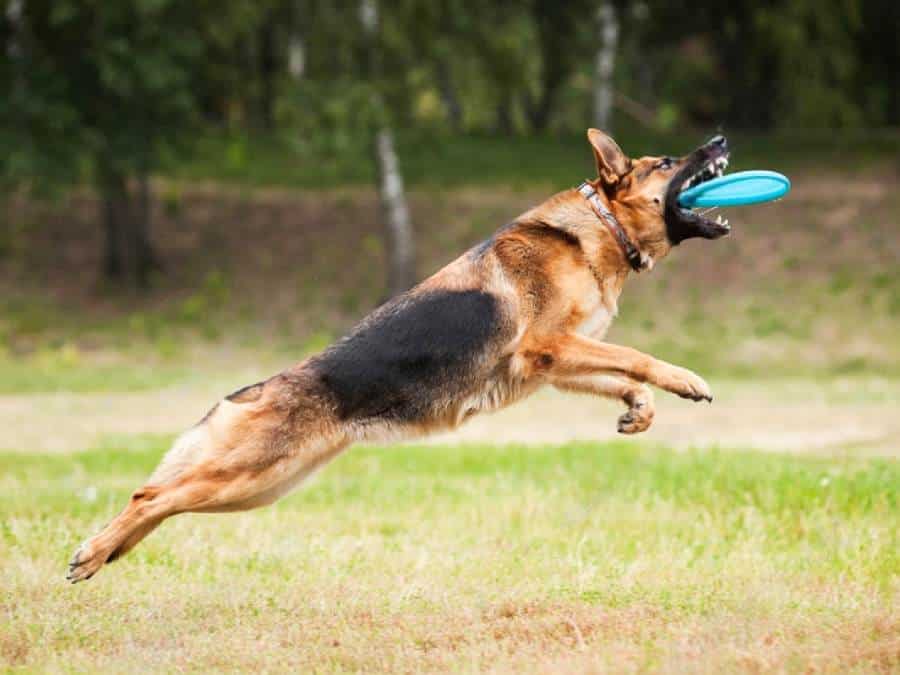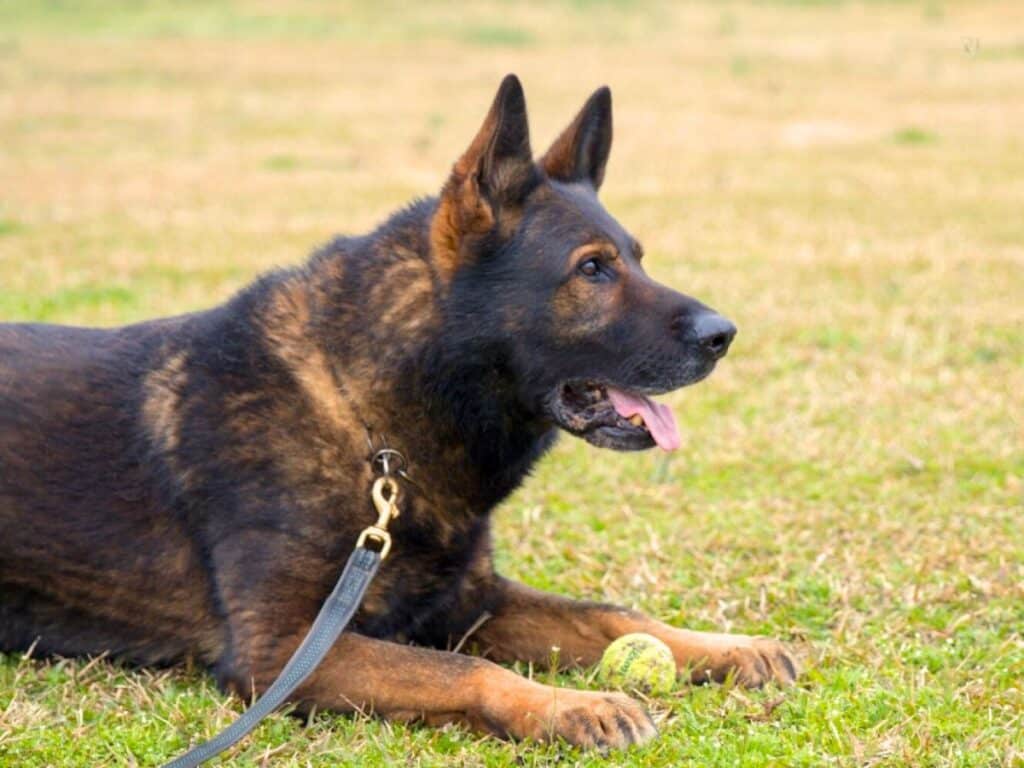German Shepherds are energetic and robust dogs, requiring ample exercise to maintain their physical and mental well-being.
Regular walks, playtime, and engaging activities are essential to prevent restlessness or destructive behavior in these intelligent canines.
So in today’s article, we will explore how much exercise a German Shepherd needs a day at each stage of their lives, from puppy to adulthood to their senior years.
How Much Exercise Does a German Shepherd Need A Day?
A German Shepherd needs at least 1 to 2 hours of exercise per day. This can include a combination of activities such as brisk walks, jogging, playtime, and mental stimulation through training or interactive toys.
German Shepherds were bred as working dogs with high energy levels and they thrive on both physical and mental challenges.
Without sufficient physical activity, they can become bored and develop behavioral problems like excessive barking, digging, or chewing.
Additionally, it’s essential to tailor your German Shepherd’s exercise routine to the specific needs of your dog. Puppies, elderly dogs, and those with health issues may require different levels and types of exercise.
How Much Exercise Does a German Shepherd Puppy Need?
German Shepherd puppies aged 8-12 weeks should have around 5 minutes of exercise per month of age, up to twice daily. For pups between 3-6 months, aim for 15-20 minutes of exercise, 2-3 times a day. As puppies reach 6-12 months, they will need at least 30 minutes to 1 hour of exercise per day.
German Shepherd puppies are known for their high energy levels and need for exercise. However, it’s crucial to be mindful of their growing bodies and not overexert them.
The exercise requirements for a German Shepherd puppy can vary depending on factors like age, individual temperament, and overall health.
RELATED: How to Navigate a German Shepherd’s Energy Levels?

German Shepherd Puppy Exercise Chart
The following German Shepherd Exercise By Age Chart provides a comprehensive guide to the recommended amount and type of exercise at different stages of a German Shepherd puppy’s life, from the early weeks to their senior years.

| Puppy’s Age | Exercise Duration | Type of Exercise |
|---|---|---|
| 8-12 Weeks | 5 minutes per month of age, 2 times a day | Short play sessions, basic training, gentle walks |
| 3-6 Months | 15-20 minutes per session, 2-3 times a day | Play, short walks, basic training |
| 6-12 Months | At least 30 minutes to 1 hour per day | Running, playing fetch, longer walks, more structured training |
| 1-7 Years | 1-2 hours per day | Running, jogging, agility training, mentally stimulating activities |
| 8 Years and Older | 30 minutes to 1 hour per day | Gentle walks, moderate play, low-impact exercises |
Remember, these are general guidelines, and individual variations may exist. Always pay attention to your puppy’s cues and consult with your veterinarian to tailor the exercise plan to your puppy’s specific needs and health.
German Shepherd Exercise By Age
Providing appropriate exercise for your German Shepherd at different stages of their life is crucial for their physical and mental well-being.
Here’s a general guideline for exercising German Shepherds based on their age:
Age 8 – 12 Weeks Old Puppies
At this stage, puppies are still very young, and their exercise should be primarily in the form of short play sessions.
Aim for around 5 minutes of exercise per month of age, up to twice a day. This can include gentle play, short walks, and basic training.
Mental stimulation is also crucial for a puppy’s development, so incorporate training sessions and puzzle toys into their routine.

3 – 6 Months Old Puppies
As the puppy grows, you can gradually increase the exercise duration. Around 15-20 minutes per session, two to three times a day is a good target.
Continue to focus on play and short walks, avoiding strenuous activities.
Please keep in mind that puppies have growing bodies, so their exercise should be low-impact and not too strenuous.
6 – 12 Months
By this age, a German Shepherd puppy can handle more extended periods of exercise. Aim for at least 30 minutes to 1 hour of physical activity per day.
You can start incorporating more vigorous activities like running, playing fetch, swimming, and longer walks.
As the puppy grows older, their exercise needs will increase, so it’s important to gradually increase the duration and intensity of their workouts.
1 – 7 Years Old GSDs
Beyond 1 year, it’s recommended to maintain a daily exercise routine of 1-2 hours, incorporating activities like daily walks, running, jogging, and mentally stimulating exercises.
Engage in more advanced training activities, agility, or canine sports if your dog enjoys them.
8 Years & Older
Senior GSDs benefit from a more gentle exercise regimen, including 30 minutes to 1 hour of activities such as gentle walks, moderate play, and low-impact exercises.
Swimming, gentle play, and mental stimulation are still important but should be adapted to their reduced energy levels.
Adjust the routine based on the senior German Shepherd’s health and comfort level.
Always be attentive to your doggy’s signals. If they seem tired or reluctant to continue, it’s essential to allow them to rest. Additionally, always consult with a veterinarian to ensure that you’re providing the right amount and type of exercise for your puppy’s specific needs.
RELATED:

What Kind of Exercise Does a German Shepherd Need?
German Shepherds are a highly intelligent and energetic breed that benefits from a combination of physical and mental exercises. Here are some types of exercises that are generally suitable for German Shepherds:
Walking and Jogging:
Regular walks and jogs are essential for maintaining their overall health and well-being.
Vary the pace and include some brisk walks or jogging sessions to cater to their energy levels.
Running and Fetch:
German Shepherds love to run, and activities like playing fetch or allowing them to run in a safe, enclosed area can be beneficial.
Agility Training:
Engage your German Shepherd in agility exercises, which not only provide physical exercise but also stimulate their minds.
Set up agility courses with obstacles like tunnels, jumps, and weave poles.
Obedience Training:
Mental stimulation is crucial for German Shepherds. Obedience training sessions not only improve their behavior but also challenge their intellect.
Teach them new commands and tricks regularly.
Tug-of-War:
A controlled game of tug-of-war can be a great strength-building exercise and can also be a bonding activity.

Interactive Toys:
Provide toys that stimulate their problem-solving skills. Puzzle toys and treat-dispensing toys can keep them occupied and mentally engaged.
Swimming:
Many German Shepherds enjoy swimming, and it’s an excellent low-impact exercise that is gentle on their joints.
Hiking:
Take your German Shepherd on hiking trails. The varied terrain and smells provide both physical and mental stimulation.
Fetch and Retrieve Games:
Playing fetch is not just about running; it also reinforces their natural retrieving instincts.
Biking:
For high-energy individuals, biking alongside them on a leash (using a bike attachment) can provide a more intense workout.
Remember to tailor the exercise routine to your individual dog’s needs and health. Regular veterinary check-ups can help ensure that the chosen activities are appropriate for your German Shepherd’s age and physical condition.
RELATED: How to Tire Out a German Shepherd

What Happens if German Shepherds Don’t Get Enough Exercise?
If German Shepherds don’t receive enough exercise, they may exhibit various physical and behavioral issues. German Shepherds are an active and intelligent breed, and regular exercise is essential for their overall well-being. Here are some potential consequences of insufficient exercise:
- Weight Gain and Obesity: Lack of exercise can lead to weight gain and obesity, which may contribute to other health problems like joint issues and diabetes.
- Behavioral Problems: German Shepherds that don’t get enough physical and mental stimulation may develop behavioral problems such as excessive barking, digging, chewing, or aggression.
- Destructive Behavior: The breed’s intelligence requires mental stimulation. Without it, they may become bored and resort to destructive behaviors, damaging furniture, and belongings, or even engaging in self-destructive behaviors.
- Hyperactivity: According to this research, insufficient exercise can result in pent-up energy, leading to hyperactivity. This may manifest as excessive jumping, pacing, or restlessness.
- Anxiety and Stress: German Shepherds are known to form strong bonds with their owners. Lack of exercise and interaction can lead to separation anxiety and stress-related behaviors.
- Health Issues: Inadequate physical activity may contribute to various health issues, including cardiovascular problems, muscle atrophy, and joint stiffness.
- Training Challenges: Without proper exercise, it can be challenging to train a German Shepherd effectively. Regular exercise helps in maintaining focus and responsiveness during training sessions.
- Reduced Lifespan: Dogs that lead sedentary lifestyles may be at a higher risk of obesity-related health issues, potentially reducing their lifespan. (Research)
To prevent these issues, German Shepherd owners must provide sufficient daily exercise, mental stimulation, and social interaction.

Signs That Your German Shepherd Needs Exercise
German Shepherds are known for their high energy levels, and they often exhibit clear signs when they need more exercise. Here are some common signs that your German Shepherd might need more physical activity:
- Restlessness: If your German Shepherd seems restless or is pacing around the house, it may indicate excess energy that needs to be expended through exercise.
- Excessive Barking: Barking can be a sign of boredom or frustration. Regular exercise helps positively channel their energy and can reduce excessive barking.
- Destructive Behavior: Chewing on furniture, digging, or other destructive behaviors may be a result of pent-up energy. Adequate exercise can help redirect these behaviors.
- Hyperactivity: Hyperactive behavior, such as jumping excessively or being overly excited, can be a sign that your German Shepherd needs an outlet for their energy.
- Whining or Pacing: Whining or constant pacing may be indicative of restlessness. A good workout can help alleviate this behavior.
- Attention-Seeking Behavior: If your German Shepherd is constantly seeking attention or becoming overly demanding, it may be an indication that they need more mental and physical stimulation.
- Weight Gain: If your dog is gaining weight or showing signs of obesity, it may be a result of insufficient exercise.
- Difficulty Sleeping: A tired dog is more likely to rest peacefully. If your German Shepherd is having difficulty settling down or sleeping through the night, it might be due to a lack of physical activity.
- Lack of Interest in Toys: If your dog suddenly loses interest in their toys or shows disinterest in activities that usually engage them, it could be a sign that they need a change in routine or more exercise.
It’s essential to observe your dog’s behavior and tailor the exercise routine accordingly. If you notice any sudden changes in behavior, it’s always a good idea to consult with a veterinarian to rule out any underlying health issues.
RELATED: German Shepherd Sleep Habits From Puppyhood to Senior Years
Final Remarks
You’ve now gained a comprehensive understanding of the exercise requirements for German Shepherds at different stages of their lives. Remember, just like us, our canine friends need a balance of physical and mental stimulation to thrive. So, take the time to create a routine that keeps them active and happy, whether it’s through outdoor activities, interactive games, or obedience training.
Frequently Asked Questions
1. How much exercise does a working line German Shepherd need?
Working line German Shepherds typically require at least 2 hours of vigorous exercise daily, including both physical and mental stimulation.
2. How much exercise does a senior German Shepherd need?
Senior German Shepherds benefit from low-impact exercises, such as short walks or gentle play, totaling around 30 minutes to an hour daily, adjusted based on individual health and mobility.
3. How much exercise does a female German Shepherd need?
The exercise needs of a female German Shepherd are similar to males, requiring daily activities such as walks, play, and mental stimulation, typically ranging from 1 to 2 hours per day.
4. How far should a German Shepherd be walked?
German Shepherds generally benefit from walks of at least 30 minutes to 2 hours, depending on age, health, and energy levels, to maintain their physical and mental well-being.
5. Is a 30-minute walk enough for a German Shepherd?
A 30-minute walk can be sufficient for some German Shepherds, especially seniors or those with lower energy levels, but many will benefit from longer walks or additional play and mental stimulation to meet their exercise needs.
FURTHER READING:




